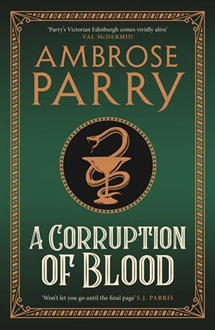Reviewed by Robert Goodman.
By Ambrose Parry, Canongate, $29.99.
 Ambrose Parry, for those who do not already know, is a partnership between best selling Scottish crime author Chris Brookmyer and his wife Dr Marisa Haetzman, an anaestheologist and medical historian. Together they are a formidable pair, crafting fascinating historical crime fiction around the Edinburgh medical profession in the late 19th Century. Both the first two books in this series – The Way of All Flesh and The Art of Dying were shortlisted for Scottish Crime Book of the Year (The McIlvanney Prize). A Corruption of Blood is their third collaboration featuring doctor Will Raven and aspiring doctor Sarah Fisher, both of whom work for the very real Dr James Young Simpson and is again a heady combination of fact and fiction.
Ambrose Parry, for those who do not already know, is a partnership between best selling Scottish crime author Chris Brookmyer and his wife Dr Marisa Haetzman, an anaestheologist and medical historian. Together they are a formidable pair, crafting fascinating historical crime fiction around the Edinburgh medical profession in the late 19th Century. Both the first two books in this series – The Way of All Flesh and The Art of Dying were shortlisted for Scottish Crime Book of the Year (The McIlvanney Prize). A Corruption of Blood is their third collaboration featuring doctor Will Raven and aspiring doctor Sarah Fisher, both of whom work for the very real Dr James Young Simpson and is again a heady combination of fact and fiction.
When A Corruption of Blood opens, Raven is witness to the finding of a baby’s corpse in the harbour. Sarah is on a trip to Europe with Dr Simpson’s sister Mina to meet with Dr Elizabeth Blackwell, the first woman to obtain a medical degree. Raven has decided to let Sarah pursue her dreams of medical qualification and has found another woman, Eugenie Todd, to court, although both fear her stern father. It is Eugenie who asks to Raven to investigate when her old friend Gideon Douglas is accused of killing his very wealthy and influential father and despite his poor view of Gideon, Raven agrees. Meanwhile on Sarah’s return to Edinburgh she is asked by one of the housemaids to try and track down a baby who she gave away at birth.
A Corruption of Blood is another worthy entry to a great series. While it starts slowly, this partly is to deepen the characters of Raven and Fisher and further complicate their relationship. That said, Raven and Fisher are themselves complex characters and their relationship as it has developed feels honest and real. Once again, the narrative if full of illuminating period detail and medical information that never feels like it is delivered didactically. And the main drivers of the plot – the machinations of the wealthy to sway public opinion, the use of scandal and shame to drive hypocritical public policy, the demonization of the poor and the desperate – are just as pertinent in the present day as they were in the times depicted.
The crime genre elements of this series are there to tie together the two protagonists and their struggles to achieve their dreams, reflections on the state of medicine and the medical profession in the 19th Century and social commentary. And, particularly as Parry plays fair with readers, crime aficionados are likely to pick both the murder and some of the late twists before they happen. But given all of the other elements in the mix, including an engaging style, that does not make this book any less enjoyable.
This and over 700 more reviews can be found on Pile by the Bed.











